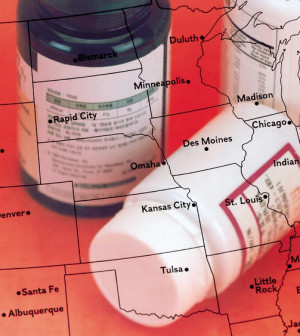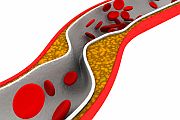- 10 Strategies to Overcome Insomnia
- Could Artificial Sweeteners Be Aging the Brain Faster?
- Techniques for Soothing Your Nervous System
- Does the Water in Your House Smell Funny? Here’s Why
- Can a Daily Dose of Apple Cider Vinegar Actually Aid Weight Loss?
- 6 Health Beverages That Can Actually Spike Your Blood Sugar
- Treatment Options for Social Anxiety Disorder
- Understanding the Connection Between Anxiety and Depression
- How Daily Prunes Can Influence Cholesterol and Inflammation
- When to Take B12 for Better Absorption and Energy
New Drug Lowers Levels of Triglyceride Blood Fats: Study


An experimental drug dramatically lowers blood levels of potentially harmful triglycerides, a new study finds.
Triglycerides are a type of blood fat created by the food you eat. At very high levels, they can cause heart problems and pancreatitis, an inflammation of the pancreas.
“Current treatment for elevated triglyceride [levels] leaves a lot to be desired,” said researcher Dr. Joseph Witztum, a professor of medicine at the University of California, San Diego. “This drug holds the promise that it will be the most effective therapy we have.”
The new drug — called ISIS 304801 for now — lowers triglyceride levels by as much as 71 percent without unpleasant side effects, the study found.
Elevated triglycerides can be caused by genetics as well as obesity, smoking, drinking too much alcohol and a diet very high in carbohydrates, the American Heart Association says.
Normal triglyceride levels are less than 150 milligrams per deciliter (mg/dL). But some people have much higher levels, which is associated with insulin resistance, metabolic syndrome, diabetes, inherited high cholesterol and certain other disorders, the researchers explained. Metabolic syndrome is a combination of high blood pressure, high cholesterol, high blood sugar and excess body fat.
A blood test will show levels of LDL (“bad”) cholesterol, along with HDL (“good”) cholesterol, and one-fifth of your triglyceride level, according to the American Heart Association.
Current treatments for elevated triglycerides include eating a healthy diet rich in fish oil and taking niacin (Niaspan), also called nicotinic acid. Drugs called fibrates, such as TriCor, can help lower triglyceride levels, but some patients don’t respond to the usual treatments, Witztum said.
The new drug works by targeting a protein — called apolipoprotein C-III — that slows the breakdown of triglycerides. In effect, ISIS 304801 speeds up the breakdown of triglycerides, allowing the fat to leave the body quickly.
“The drug lowers triglyceride and probably manifestations of insulin resistance and metabolic syndrome,” Witztum said.
For the study, researchers treated 57 patients with the drug or an inactive placebo. Their triglyceride levels ranged between 350 and 2,000 mg/dL, and they received weekly doses of the drug over 13 weeks.
The study also included 28 people who had triglyceride levels ranging from 225 to 2,000 mg/dL, who had been receiving fibrate therapy. These patients also received the new drug or placebo.
Overall, the researchers found that ISIS 304801 reduced triglyceride levels 31 percent to 71 percent.
This trial was the second of three required for drug approval in the United States. Witztum said that phase 3 trials are underway, but the results will not be available for two to three years.
Initially, the drug is intended to treat people who suffer from conditions such as inherited chylomicronemia syndrome that cause very high triglyceride levels, he said. In this condition, the body doesn’t break down fats correctly.
In the long run, Witztum believes the drug will be used by a larger population to help prevent heart disease related to high triglyceride levels.
The trial was funded by Isis Pharmaceuticals, the drug’s maker, and the results were published July 30 in the New England Journal of Medicine.
Dr. Gregg Fonarow, a professor of cardiology at the University of California, Los Angeles, said the study findings appear promising.
However, “whether lowering of triglyceride levels will in and of itself result in reduction in cardiovascular events remains to be demonstrated,” he said.
Further studies are needed, Fonarow said, to evaluate the drug’s safety and effectiveness, and determine whether it can prevent problems caused by high triglycerides.
“While the patient population that may benefit from a safe and effective triglyceride-lowering medication is more limited than the very broad population that have been shown to benefit from statin therapy to reduce cholesterol, there remains an important, but still unmet, clinical need,” Fonarow said.
More information
For more about triglyceride and cholesterol levels, visit the U.S. Centers for Disease Control and Prevention.
Source: HealthDay
Copyright © 2026 HealthDay. All rights reserved.










